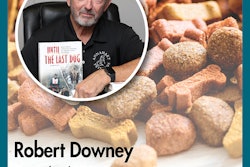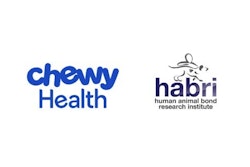
Robert Downey, founder and CEO of Annamaet as well as author of the book "Until the Last Dog," recently shared his perspective on the pet food industry's evolution over more than 35 years during the latest Trending: Pet Food podcast with Lindsay Beaton, editor of Petfood Industry.
Downey, a companion animal nutritionist, discussed how pet humanization has transformed manufacturing standards, the challenges facing the supplement market, and gaps in veterinary nutrition education. The conversation covered pressing industry issues from obesity's impact on pet longevity to the limitations of private research funding in advancing nutritional science.
Below are 10 takeaways from EPISODE 95: The evolution of pet nutrition with Robert Downey of Annamaet.
- Pet humanization drives industry standards. Downey attributed the pet food industry's evolution primarily to pet humanization, noting that over 90% of pet owners now consider their pets essential family members, demanding transparency and higher standards.
- Vitamin supplementation has increased 30% in 15 years. Downey pointed out that the industry has shifted dramatically from minimizing vitamin levels to avoid clinical deficiency to substantially increasing supplementation as pet owners demand better nutrition.
- Graduate research showed 30% stamina increase through macronutrient manipulation. Downey's early research demonstrated that altering protein, fats and carbohydrates could increase stamina by 30%, which influenced his approach to developing Annamaet's formulations with focus on ingredient quality and processing methods.
- Home-prepared diet vitamin/mineral supplement became top-selling SKU. Within two years of introducing a vitamin mineral package specifically for home-prepared diets, it became Annamaet's biggest selling SKU, which Downey noted addressed a gap where pet owners and veterinarians lacked proper supplementation for homemade formulas.
- Veterinary schools lack comprehensive nutrition education. Downey noted that less than half of teaching veterinary schools in the U.S. have a core nutrition course, with most veterinarians receiving limited nutritional education primarily from large kibble companies.
- Supplement market lacks scientific backing. Downey expressed concern that many companies rush to market with supplements lacking peer-reviewed testing, particularly in the joint supplement category where poor quality products can undermine consumer confidence in effective formulations.
- Obesity is the number one problem facing pets. Research shows obesity as the leading health issue for pets, with proper weight management potentially extending lifespan by two years for dogs and cats.
- Pets are living longer, revealing new geriatric health challenges. Downey observed that as pets live longer lives, the industry is encountering geriatric maladies that weren't previously common because animals didn't survive long enough to develop them, creating new opportunities for nutritional research.
- Transparency education drives retail engagement. Annamaet conducted training videos and evening lectures at retail stores titled "Transparency in the Pet Industry" and "Myths of the Pet Food Industry," which have been well-received by both customers and competitors' sales representatives.
- Private research funding limits industry knowledge sharing. Unlike poultry, beef and dairy industries with associations funding research, most pet food research is conducted by private companies that may not share data, though board certified veterinary nutritionists are working to advance cutting-edge research.

















